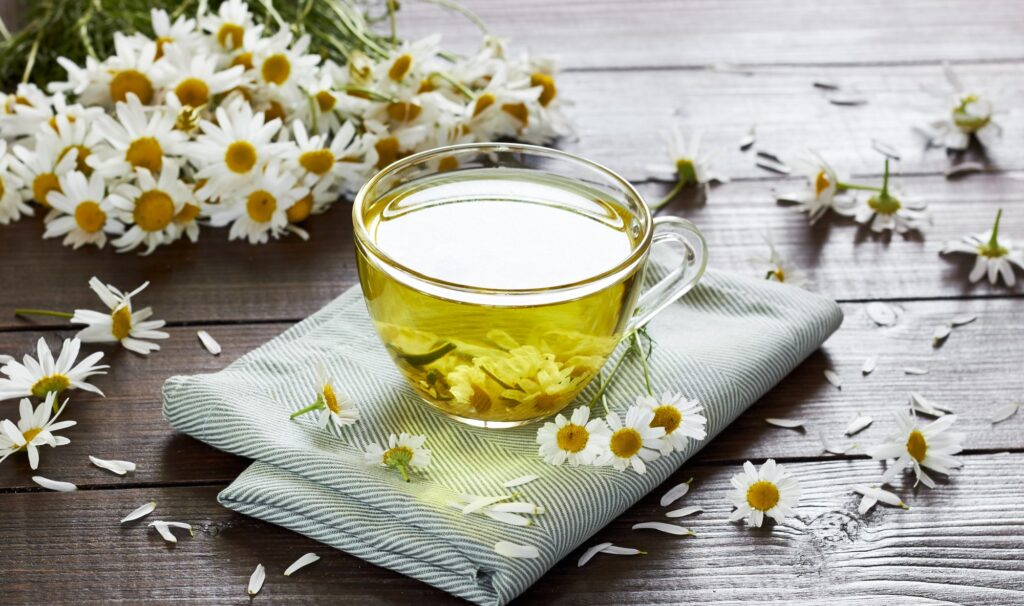
Chamomile tea is a popular herbal infusion made from the dried flowers of the chamomile plant. This aromatic beverage has been enjoyed for centuries, dating back to ancient Egypt and Rome, where it was revered for its healing properties. The tea is commonly made from two varieties of chamomile: German chamomile (Matricaria recutita) and Roman chamomile (Chamaemelum nobile), each offering slightly different flavor profiles and benefits.
The preparation of chamomile tea involves steeping the dried flower heads in hot water, allowing the beneficial compounds to infuse into the liquid. This process releases the tea’s characteristic apple-like fragrance, which is both soothing and refreshing. Chamomile tea is often consumed for its calming effects and is a staple in many households for its ability to promote relaxation and well-being.
A distinctive feature of chamomile tea is its versatility. It can be enjoyed on its own, or combined with other herbs and flavors such as mint, lemon, or honey, to enhance its taste and benefits. Whether consumed hot or cold, chamomile tea is a delightful beverage that caters to a wide array of preferences and health needs.
Chamomile Tea Benefits: A Deep Dive
Chamomile tea is renowned for its numerous health benefits, making it a staple in natural remedy practices worldwide. One of its most celebrated attributes is its ability to promote relaxation and reduce stress. The tea contains apigenin, an antioxidant that binds to certain receptors in the brain, promoting a calming effect and aiding in stress management.
Beyond its calming properties, chamomile tea is also known for its anti-inflammatory and pain-relieving effects. This makes it a popular choice for individuals dealing with conditions such as arthritis or menstrual cramps. The tea’s natural compounds can help reduce swelling and pain, offering a gentle and natural approach to managing discomfort.
Moreover, chamomile tea is often used to support digestive health. It can help alleviate symptoms such as indigestion, bloating, and gas, thanks to its antispasmodic properties. Regular consumption of chamomile tea can promote a healthy digestive system and enhance overall gut health, making it a valuable addition to one’s daily routine.
What is Chamomile Tea Good For?
Chamomile tea is good for a variety of health concerns, thanks to its wide range of beneficial properties. Primarily, it is acclaimed for its role in promoting restful sleep and alleviating insomnia. The tea’s natural sedative effects help to relax the nervous system, making it an excellent choice for individuals struggling with sleep disturbances.
In addition to supporting sleep, chamomile tea is effective in boosting immune function. Its antioxidant properties help combat oxidative stress and protect against common illnesses such as colds and flu. Regular consumption of chamomile tea can enhance the body’s natural defenses, keeping infections at bay and promoting overall wellness.
Chamomile tea is also beneficial for skin health. Its anti-inflammatory and antibacterial properties can help soothe skin irritations, reduce redness, and promote healing. Whether used topically or consumed as a beverage, chamomile tea can contribute to a healthy, radiant complexion, making it a favorite among natural skincare enthusiasts.
Does Chamomile Tea Have Caffeine?
Chamomile tea is naturally caffeine-free, making it an ideal choice for those seeking to avoid stimulants. Unlike traditional teas derived from the Camellia sinensis plant, chamomile is an herbal infusion that does not contain any caffeine. This characteristic allows individuals to enjoy chamomile tea at any time of day without the risk of disrupting their sleep patterns or experiencing jitteriness.
The absence of caffeine in chamomile tea makes it suitable for people of all ages, including children and the elderly. It serves as a comforting beverage that can be enjoyed as part of a nightly ritual to unwind and prepare for restful sleep. Additionally, its caffeine-free nature makes it a popular choice for pregnant women and those sensitive to caffeine.
For those accustomed to caffeinated beverages, switching to chamomile tea can be a gentle way to reduce caffeine intake while still enjoying a flavorful and satisfying drink. The tea’s calming effects can also help ease the transition, providing a soothing alternative to coffee or traditional tea.
Does Chamomile Tea Make You Sleepy?
Chamomile tea is widely recognized for its ability to promote sleepiness and relaxation, making it a popular bedtime beverage. The tea contains apigenin, a natural compound that binds to receptors in the brain, inducing a sense of calm and facilitating sleep. This makes chamomile tea an excellent choice for individuals dealing with insomnia or difficulty falling asleep.
The soothing effects of chamomile tea are not limited to inducing sleep; they also help enhance the quality of sleep. Many people report experiencing deeper and more restful sleep after incorporating chamomile tea into their nightly routine. The improved sleep quality can lead to better overall health, increased energy levels, and enhanced cognitive function during waking hours.
While chamomile tea can promote sleepiness, it is important to note that its effects may vary from person to person. Some individuals may experience more pronounced sedative effects, while others may find it only mildly relaxing. Experimenting with the timing and quantity of consumption can help individuals tailor the tea’s effects to their specific needs and preferences.
Chamomile Tea Side Effects: What to Watch Out For
While chamomile tea is generally considered safe for most people, there are some potential side effects to be aware of. One possible side effect is an allergic reaction, particularly for those allergic to plants in the Asteraceae family, such as ragweed or marigolds. Symptoms may include skin rashes, throat irritation, or difficulty breathing, and individuals with known allergies should exercise caution.
Another consideration is the potential for chamomile tea to interact with certain medications. The tea’s natural compounds may enhance the effects of blood thinners, leading to an increased risk of bleeding. It is advisable for individuals taking anticoagulant medications to consult with a healthcare provider before consuming chamomile tea regularly.
Additionally, excessive consumption of chamomile tea may lead to nausea or vomiting in some individuals. Moderation is key, and it is recommended to start with small quantities and observe how the body responds. As with any herbal remedy, it is important to listen to one’s body and adjust consumption accordingly to avoid adverse effects.
Best Chamomile Tea Brands to Try
For those looking to explore the world of chamomile tea, several brands offer high-quality options that cater to different tastes and preferences. Here are some of the best chamomile tea brands to consider:
- Traditional Medicinals: Known for their organic and sustainably sourced ingredients, Traditional Medicinals offers a classic chamomile tea that is both flavorful and effective.
- Tazo Calm Chamomile: This blend combines chamomile with other soothing herbs like rose petals and hibiscus, creating a complex and aromatic tea experience.
- Celestial Seasonings Chamomile: A widely available brand, Celestial Seasonings provides a smooth and mellow chamomile tea that is perfect for relaxation.
- The Republic of Tea: Their chamomile lemon blend offers a refreshing twist on traditional chamomile tea, with a hint of citrus to invigorate the palate.
- Yogi Tea: Known for their wellness-focused blends, Yogi Tea offers a chamomile tea that includes additional herbs like lemongrass and spearmint for a unique and calming experience.
When selecting a chamomile tea, consider factors such as flavor preferences, organic certification, and additional ingredients to find a blend that suits your needs. Trying different brands can help you discover your favorite chamomile tea and enhance your overall tea-drinking experience.
What Does Chamomile Tea Taste Like?
Chamomile tea is known for its delicate and pleasant flavor, often described as a blend of floral and apple-like notes. The tea’s taste is naturally sweet and slightly earthy, with a smooth and calming finish. This makes it an ideal choice for those who prefer mild and soothing beverages.
The flavor profile of chamomile tea can vary depending on the specific variety and preparation method. German chamomile is typically sweeter and more apple-like, while Roman chamomile may have a slightly more bitter and herbal taste. Both varieties, however, offer a delightful and comforting drinking experience.
To enhance the taste of chamomile tea, many people choose to add complementary flavors such as honey, lemon, or mint. These additions can accentuate the tea’s natural sweetness and provide additional layers of flavor. Experimenting with different ingredients allows for a personalized tea experience that caters to individual taste preferences.
Brewing Tips for the Perfect Cup of Chamomile Tea
Creating the perfect cup of chamomile tea involves a few simple steps that ensure optimal flavor and benefits. Here are some brewing tips to help you enjoy this soothing beverage to the fullest:
- Select High-Quality Chamomile: Opt for organic chamomile flowers or high-quality tea bags to ensure a pure and flavorful infusion. Quality ingredients make a significant difference in the taste and effectiveness of the tea.
- Use Fresh, Filtered Water: Start with fresh, filtered water and bring it to a gentle boil. Using clean water enhances the tea’s flavor and prevents any unwanted tastes from interfering with the delicate chamomile notes.
- Steep for the Right Amount of Time: Allow the chamomile to steep for 5-10 minutes, depending on your taste preference. A longer steeping time results in a stronger flavor and more pronounced benefits, while a shorter steeping time yields a milder cup.
- Enhance with Natural Sweeteners: If desired, add a touch of honey or a slice of lemon to complement the tea’s natural sweetness. These additions can enhance the flavor and provide additional health benefits.
- Experiment with Blends: Try combining chamomile with other herbs such as lavender or peppermint to create unique and personalized blends. This allows for a tailored tea experience that caters to specific health needs and taste preferences.
By following these tips, you can craft a perfect cup of chamomile tea that is both delicious and beneficial, providing a moment of tranquility and relaxation in your day.
Embracing Chamomile Tea in Your Wellness Routine
Incorporating chamomile tea into your daily wellness routine can offer a range of health benefits and a moment of peace in a busy day. Whether you’re seeking to improve sleep quality, reduce stress, or support digestive health, chamomile tea provides a natural and effective solution. Its calming properties make it an ideal choice for creating a soothing bedtime ritual or simply unwinding after a long day.
Exploring different chamomile tea brands and experimenting with various blends can enhance your tea-drinking experience and help you discover the flavors that resonate with you. By embracing chamomile tea, you open the door to a world of relaxation and wellness, supported by centuries of traditional use and modern scientific insights.
For those eager to experience the benefits of chamomile tea firsthand, consider starting with a high-quality brand and incorporating it into your daily routine. Whether enjoyed hot or iced, on its own or with added flavors, chamomile tea is a versatile and delightful beverage that can enrich your life in numerous ways.
Call to Action: Take the first step towards a more relaxed and healthy lifestyle by trying chamomile tea today. Discover the soothing effects and delicious flavor that have made this herbal infusion a beloved choice for generations. Share your chamomile tea journey with friends and family, and explore the many ways this simple beverage can enhance your well-being.







